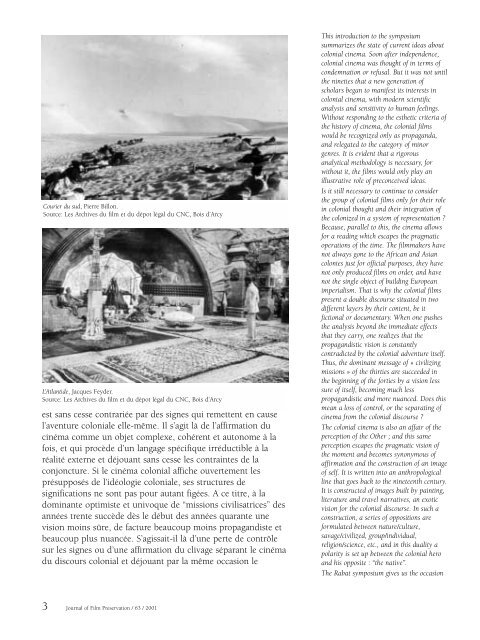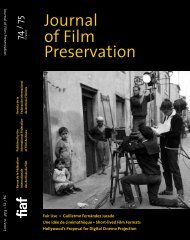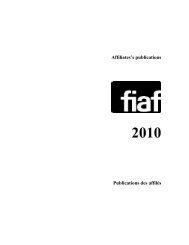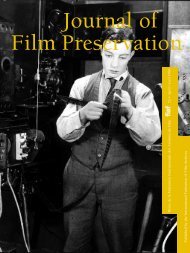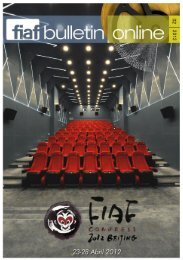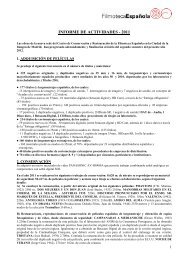Journal of Film Preservation - FIAF
Journal of Film Preservation - FIAF
Journal of Film Preservation - FIAF
You also want an ePaper? Increase the reach of your titles
YUMPU automatically turns print PDFs into web optimized ePapers that Google loves.
Courier du sud, Pierre Billon.<br />
Source: Les Archives du film et du dépot légal du CNC, Bois d’Arcy<br />
L’Atlantide, Jacques Feyder.<br />
Source: Les Archives du film et du dépot légal du CNC, Bois d’Arcy<br />
est sans cesse contrariée par des signes qui remettent en cause<br />
l’aventure coloniale elle-même. Il s’agit là de l’affirmation du<br />
cinéma comme un objet complexe, cohérent et autonome à la<br />
fois, et qui procède d’un langage spécifique irréductible à la<br />
réalité externe et déjouant sans cesse les contraintes de la<br />
conjoncture. Si le cinéma colonial affiche ouvertement les<br />
présupposés de l’idéologie coloniale, ses structures de<br />
significations ne sont pas pour autant figées. A ce titre, à la<br />
dominante optimiste et univoque de “missions civilisatrices” des<br />
années trente succède dès le début des années quarante une<br />
vision moins sûre, de facture beaucoup moins propagandiste et<br />
beaucoup plus nuancée. S’agissait-il là d’une perte de contrôle<br />
sur les signes ou d’une affirmation du clivage séparant le cinéma<br />
du discours colonial et déjouant par la même occasion le<br />
3 <strong>Journal</strong> <strong>of</strong> <strong>Film</strong> <strong>Preservation</strong> / 63 / 2001<br />
This introduction to the symposium<br />
summarizes the state <strong>of</strong> current ideas about<br />
colonial cinema. Soon after independence,<br />
colonial cinema was thought <strong>of</strong> in terms <strong>of</strong><br />
condemnation or refusal. But it was not until<br />
the nineties that a new generation <strong>of</strong><br />
scholars began to manifest its interests in<br />
colonial cinema, with modern scientific<br />
analysis and sensitivity to human feelings.<br />
Without responding to the esthetic criteria <strong>of</strong><br />
the history <strong>of</strong> cinema, the colonial films<br />
would be recognized only as propaganda,<br />
and relegated to the category <strong>of</strong> minor<br />
genres. It is evident that a rigorous<br />
analytical methodology is necessary, for<br />
without it, the films would only play an<br />
illustrative role <strong>of</strong> preconceived ideas.<br />
Is it still necessary to continue to consider<br />
the group <strong>of</strong> colonial films only for their role<br />
in colonial thought and their integration <strong>of</strong><br />
the colonized in a system <strong>of</strong> representation ?<br />
Because, parallel to this, the cinema allows<br />
for a reading which escapes the pragmatic<br />
operations <strong>of</strong> the time. The filmmakers have<br />
not always gone to the African and Asian<br />
colonies just for <strong>of</strong>ficial purposes, they have<br />
not only produced films on order, and have<br />
not the single object <strong>of</strong> building European<br />
imperialism. That is why the colonial films<br />
present a double discourse situated in two<br />
different layers by their content, be it<br />
fictional or documentary. When one pushes<br />
the analysis beyond the immediate effects<br />
that they carry, one realizes that the<br />
propagandistic vision is constantly<br />
contradicted by the colonial adventure itself.<br />
Thus, the dominant message <strong>of</strong> « civilizing<br />
missions » <strong>of</strong> the thirties are succeeded in<br />
the beginning <strong>of</strong> the forties by a vision less<br />
sure <strong>of</strong> itself, becoming much less<br />
propagandistic and more nuanced. Does this<br />
mean a loss <strong>of</strong> control, or the separating <strong>of</strong><br />
cinema from the colonial discourse ?<br />
The colonial cinema is also an affair <strong>of</strong> the<br />
perception <strong>of</strong> the Other ; and this same<br />
perception escapes the pragmatic vision <strong>of</strong><br />
the moment and becomes synonymous <strong>of</strong><br />
affirmation and the construction <strong>of</strong> an image<br />
<strong>of</strong> self. It is written into an anthropological<br />
line that goes back to the nineteenth century.<br />
It is constructed <strong>of</strong> images built by painting,<br />
literature and travel narratives, an exotic<br />
vision for the colonial discourse. In such a<br />
construction, a series <strong>of</strong> oppositions are<br />
formulated between nature/culture,<br />
savage/civilized, group/individual,<br />
religion/science, etc., and in this duality a<br />
polarity is set up between the colonial hero<br />
and his opposite : “the native”.<br />
The Rabat symposium gives us the occasion


